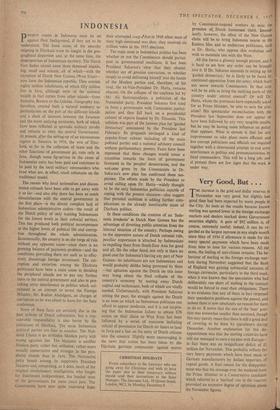Very Good, But . . .
THE increase in the gold and dollar reserves in November was very good, but slightly less good than had been expected by many people in the City. As soon as the results became known sterling was quoted lower in the foreign exchange markets and dealers marked down Government securities slightly. A gain of $92 million is, of course, extremely useful; indeed, it can be re- garded as the largest increase in any single month since May of 1954 if allowance is made for the many special payments which have been made from time to time for various: reasons. All the same, the feeling of anti-climax remains. The be- haviour of sterling in the foreign exchange mar- kets during November suggested that the Bank of England was gaining substantial amounts of foreign currencies, particularly in the third week, when it was known that the speculators who had deliberately run short of sterling in the summer would be forced to meet their obligations. There is no evidence that any of them in fact reopened their speculative positions against the pound, and indeed there is now absolutely no reason for them to do so. It seems that the size of the 'bear' posi- tion was somewhat smaller than assumed, though this may merely mean that there is still a good deal of covering to be done by speculators during December. Another explanation for this dis- appointment was that the sterling countries have still not managed to earn a surplus with Europe— in fact there was an insignificant deficit of £1 million for November. This probably reflects the very heavy payments which have been made to German manufacturers by Indian importers of capital goods. A final reason for the disappoint- ment was that the message over the weekend from the Prime Minister to a Conservative candidate which referred to a 'marked' rise in the reserves provoked an excessive degree of optimism about the November figures.














































 Previous page
Previous page